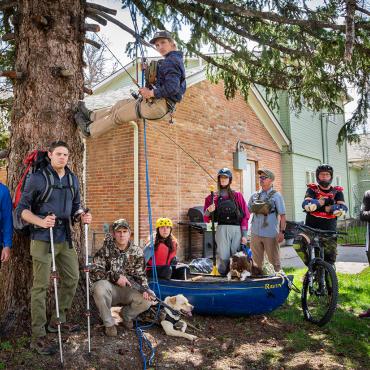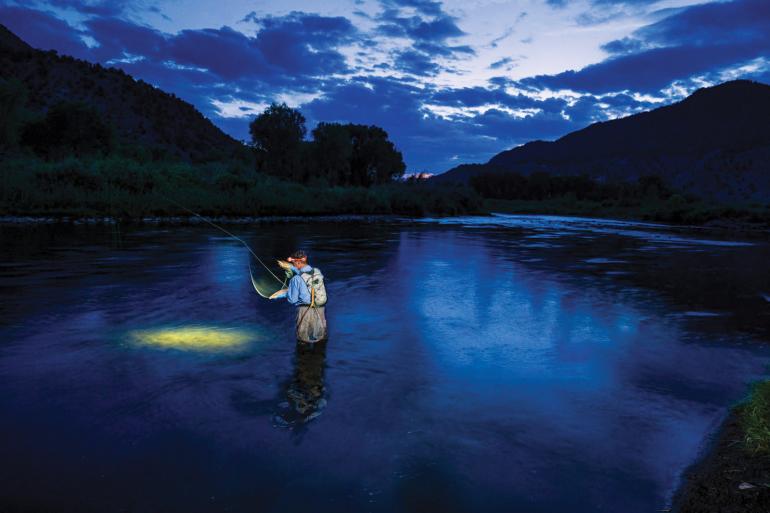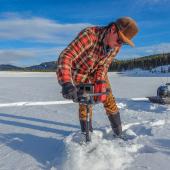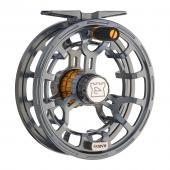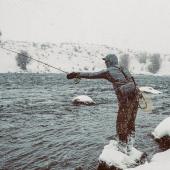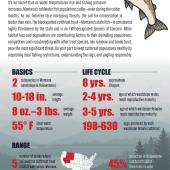Night on the Town
A night-fishing Q&A with Sweetwater Fly Shop owner Dan Gigone.
The old adage, “when the cat’s away, the mice will play,” might hold true elsewhere, but on the crowded waters of southwest Montana, a more fitting expression might be, “when the people are away, the mice can play.” Once darkness falls, and the flocks of driftboats turn back to Bozeman, the best of the best is just heating up: night fishing. If anyone knows this, it’s Sweetwater Fly Shop owner Dan Gigone. We sat down with Dan and picked his brain for the down-and-dirty on catching big fish at night.
O/B: What’s so great about fishing after dark?
DG: The largest fish, especially predatory, mature brown trout, are primarily nocturnal feeders. When the sun goes down, the big ones come out to play, and they’re looking for a big meal! But don’t be surprised if you land a nice rainbow or cutthroat, or even an ambitious whitefish.
Do you fish with a headlamp?
I use a headlamp while accessing my chosen fishing spot, rigging up, photographing and releasing fish, and the like. And I carry a spare flashlight if I’m going any distance from my vehicle. While actively fishing, I turn the light off and my senses on. If nothing else, the experience is enhanced by being on the river and swinging flies in the dark. And every time you use a light, your eyes will take some time to re-adjust to the darkness.
Are there any special regulations?
There are no restrictions on night fishing in Montana. If a river is under hoot-owl restrictions due to warm water, you have to wait until after midnight to start fishing so the water has a chance to cool to temperatures that are less stressful for the fish.
Do you ever fish dry flies (i.e., caddis)?
Strike detection is a limiting factor in the dark, but skating a caddis dry (or a soft hackle) can bring fish up and also provide a tactile take.
What’s the best time of year to go?
Fall is a great time to target big brown trout as they prepare for the spawn and for winter. But fishing in the pre-runoff spring can get you some nice fish as well, as the water warms and trout start eating actively. Night fishing can also be a good option in summer, with cooler water and less pressure than during the daylight hours. The closer to a full moon the better, as visibility will be better for you and the fish.
We know that trout sometimes spawn at night on highly pressured rivers. How do you identify spawning beds and steer clear of them?
In general, I’d recommend you scout out your planned nocturnal fishing location in the daylight. In the spring, when rainbow and cutthroat are spawning, and again in the fall when the brown trout are procreating, look for any cleared patches of gravel—the “redds” where trout lay and fertilize the next generation. Daylight scouting will also help you identify the best areas to fish and any safety issues to consider when you return in the dark.
What’s the deal with mice?
Mice are also more active at night, so the chance of a swimming rodent is greater in the dark. But that doesn’t mean you shouldn’t try skating a mouse in the daylight. You may not be as likely to swing up a trophy trout under the sun, but the odds aren’t zero.
What are some of your favorite flies?
Other than skating a mouse, I favor larger articulated streamers. Black is my go-to color, as the fish are usually looking up at the fly silhouetted against the sky. I prefer a streamer with a big head that will create more commotion in the water. Remember, trout use their lateral lines to pick up vibrations and locate prey.
Do you fish from a boat, or wade?
I always wade. There’s just something about standing in the water at night, experiencing a familiar fishing spot in a radically different way. But a float in the dark can be productive and fun. Just be sure to float a stretch that you know well. Missing the takeout sucks!
Do you have any other tips for a first-time night fisherman?
If possible, fish where you know. If you’ve fished a spot in the sunlight, you’ll have a better idea of the productive water, as well as any hazards. And try not to get too focused on catching the fish of a lifetime. A big part of nocturnal fishing is experiencing the river and ecosystem in a way that most anglers never will. Have fun and be safe.

